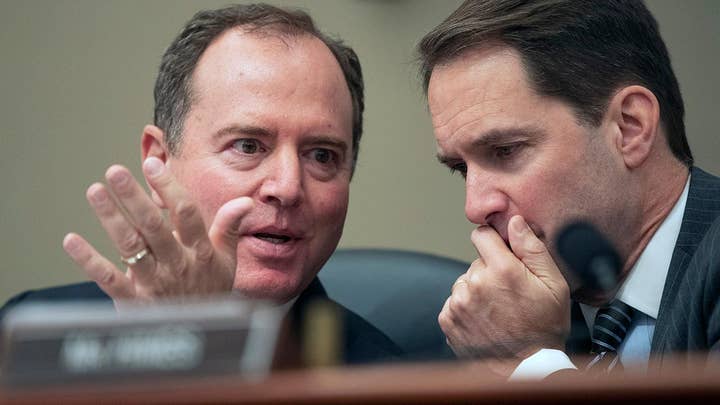What are the questions Robert Mueller still needs to answer?
Could Mueller testifying backfire on Democrats? 'The Russia Hoax' author Gregg Jarrett and Fox News contributor Sara Carter weigh in.
House Democrats are planning to turn former Special Counsel Robert Mueller’s highly anticipated congressional testimony next week into a marathon string of hearings, setting the stage for what could be hours of back-to-back questioning by dozens of lawmakers in public and closed-door settings.
A number of details, though, were still being ironed out, with the scheduled appearance just a week away. Lawmakers met later Wednesday to try finalizing the structure of the politically charged hearings, but said afterwards that discussions were “in flux” and some sticking points may not be resolved until the day of the hearing.
This is what is known so far: Mueller, who was subpoenaed last month, is set to appear July 17. The plan is for him to testify in public before the House Judiciary Committee for two hours or more, followed by another two hours-plus of testimony before the House Intelligence Committee in an open setting.
HOUSE JUDICIARY DEMS PREPARE SLEW OF SUBPOENAS FOR TRUMP-TIED TARGETS
But there are conflicting details over plans for a subsequent private session. One source told Fox News that the Democrats plan to have Mueller testify behind closed doors -- yet it remains unclear if Mueller himself would participate or if his deputies would answer questions instead.
House Intelligence Committee Chairman Adam Schiff, D-Calif., has said that the closed-door session would only be with the special counsel’s staff, but House Judiciary Committee Chairman Jerrold Nadler, D-N.Y., left the door open to the possibility that Mueller could testify privately as well. It also remains unclear whether the two committees would hold a joint closed-door session or two separate ones.
“This is already a weird hearing, with Nadler and Schiff contradicting each other publicly about who will testify behind closed doors,” a Republican source with one of the committees told Fox News.
Meanwhile, despite the mounting anticipation over the hearing, Mueller has already signaled he does not want to go beyond the details included in his already public special counsel report. Both Nadler and Schiff subpoenaed Mueller last month after the special counsel explicitly said he did not intend to testify before Congress at all.
“He was not willing to testify in public, but we thought it absolutely essential that he testify in public so that people can see it and hear it and that was what the negotiation was all about,” Nadler told MSNBC’s Rachel Maddow this week.
Amid the back and forth over the hearing's format, Attorney General Bill Barr even raised the possibility of giving Mueller an exit ramp.
“I was disappointed to see the subpoena because I don’t think that serves any purpose dragging Bob Mueller up if he, in fact, is going to stick to the report,” Barr said Monday. “It seems to be the only reason for doing that is to create some kind of public spectacle. And if Bob decides he does not want to be subject to that, then the Department of Justice would certainly back him.”
So far, there's no indication that Mueller would back out. A spokesman for Mueller declined to comment.
During his only public appearance during his tenure as special counsel in May, Mueller had said: “I hope and expect this to be the only time I will speak to you on this matter.”
“There has been a discussion about an appearance before Congress,” Mueller said. “Any testimony from this office would not go beyond our report. It contains our findings and analysis, and the reasons for the decisions we made. We chose those words carefully and the work speaks for itself.”
During that press conference, Mueller announced the closing of his office and detailed the findings of the Russia investigation, underscoring that there “was not sufficient evidence to charge a conspiracy” with regard to whether members of the Trump campaign coordinated with the Russian government during the 2016 presidential election. His language on the question of whether the president obstructed justice nevertheless left the issue open and was seen by Democrats as a cue to keep digging.
“If we had had confidence that the president clearly did not commit a crime, we would have said that,” Mueller said. “We did not determine whether the president did commit a crime.”
Mueller explained longstanding Justice Department policy, which states that a sitting president cannot be charged with a crime, noting that “charging the president with a crime was not an option we could consider.”
“We concluded that we would not reach a determination one way or the other about whether the president committed a crime,” Mueller said. “That is the office’s final position.”
Mueller added that it would be “unfair to accuse someone of a crime when there could be no court resolution of the charge,” and added that “the Constitution requires a process other than the criminal justice system to formally accuse the president of wrongdoing.”
On that, Mueller and Barr split -- with the attorney general saying that he "personally felt" Mueller could have reached a decision on obstruction.
But congressional Democrats took Mueller's statement as a green light to intensify existing Trump-focused investigations, with some calling for impeachment proceedings.
Nadler and Schiff’s committees, as well as others including the House Foreign Affairs and House Financial Services Committees, have ramped up their investigations into the president. Just this week, Nadler announced that he planned to subpoena a dozen prominent Trump-related individuals.
TRUMP HITS BACK AT MUELLER HEARING PLANS
Meanwhile, President Trump cast the Mueller hearing as yet another chapter in the Russia saga.
"It never ends," Trump said last month during an interview with Fox Business' Maria Bartiromo.
Fox News' Chad Pergram contributed to this report.






